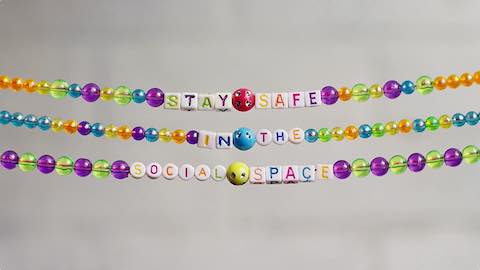- MENU
- HOME
- SEARCH
- WORLD
- MAIN
- AFRICA
- ASIA
- BALKANS
- EUROPE
- LATIN AMERICA
- MIDDLE EAST
- United Kingdom
- United States
- Argentina
- Australia
- Austria
- Benelux
- Brazil
- Canada
- China
- France
- Germany
- Greece
- Hungary
- India
- Indonesia
- Ireland
- Israel
- Italy
- Japan
- Korea
- Mexico
- New Zealand
- Pakistan
- Philippines
- Poland
- Russia
- South Africa
- Spain
- Taiwan
- Turkey
- USA
- BUSINESS
- WEALTH
- STOCKS
- TECH
- HEALTH
- LIFESTYLE
- ENTERTAINMENT
- SPORTS
- RSS
- iHaveNet.com: Technology

Cyber Street Smarts: Stay Safe in the Social Space
by Nicholas Pell
Social media can feel like a safe place to share the details of life with friends and family -- but that isn't always the case. While it's important for all of us to understand the online threats posed by social media, it's critical for new users to become familiar with safe online etiquette.
Here's a safety primer for new social media users that can also serve as a good refresher for online communication experts:
What Are the Threats?
Because most individuals and businesses are familiar with cyber security, it's increasingly rare to find computers without proper Internet Security software and protection firewalls. Online criminals have taken note of this trend and are looking at other avenues for gaining access to personal information; social media is the perfect source.
The motivation behind social media attacks is monetary gain, usually through identity theft or sophisticated computer/social media hacks. However, there can be physical threats posed by social media too, including cyber stalking and burglary.
These threats are serious and happen all the time; don't let yourself become a victim. Follow these tips to keep safe while using social media.
Don't Overshare
One of the biggest issues new users must overcome is managing the content they broadcast online. New users, particular young users, tend to overshare personal information such as what schools they go to, their dates of birth, employer info, and just about every other bit of personal minutia one can imagine.
Some users falsely believe that sharing personal information on one site and other details on another is safe because they're different websites or applications. Online criminals are smart and resourceful, though. If given the opportunity, they'll piece together everything they need to know.
Be aware of what you post online and strive to limit the details of your personal information. Never share information like bank account info, full addresses or birthdates, children's names, school locations, or the names of employers. Make sure the security features on your social media accounts are active or enabled. Confirm your email and password are secure. If you think they've been compromised, change them immediately.
Avoid Malicious Codes
Software designed to infiltrate your computer or social media account with the intention of stealing personal data is often referred to as malware or spyware. To install this software, the attacker has to trick you into clicking on a link. Sometimes it's impossible to tell a good link from one that's been designed to do you harm, but there are some things you can be on the lookout for when you're browsing links on social media.
First, keep an eye out for shortened URLs. Shortened URLs are shorthand versions of longer links delivered by websites like bit.ly and Ow.ly. These links are popular on social sites like Twitter, where character count is restricted. These short URLs are also popular among cyber criminals because users can't see the full URL until it's too late.
Avoid clicking on these links -- but if you have to, hover over the short link until the full URL is displayed in the lower corner of the browser. If it looks familiar, you're good to go. If you're ever not sure about a link, better safe than sorry. You can always visit the site in question by directly typing it into your URL bar in your browser.
Avoid Physical Attacks
Another serious threat often leveraged via social media is cyber stalking and burglary. Both offenses can result in physical harm to you or your personal possessions and should be taken very seriously.
Cyber stalking can result in physical altercation but usually begins with excessive electronic communications including email, harassment on social media, phone calls, or texting. These problems can be avoided by limiting the personal information you expose online and keeping your privacy settings secure.
While it's very tempting to broadcast a planned vacation, doing this is particularly dangerous because an online assailant might be able to piece together that your home is not safely occupied and hence an easy target for burglary.
The best thing a user can to do to avoid both kinds of attacks is to limit personal information detailing your whereabouts, especially when you plan on leaving for vacation.
As social media evolves, so too must each user to ensure personal privacy and physical protection. Make an effort to share these tips with new users and keep up to date with security changes as they roll out. Remaining vigilant about online security is the best thing each user can to do to help themselves and others.